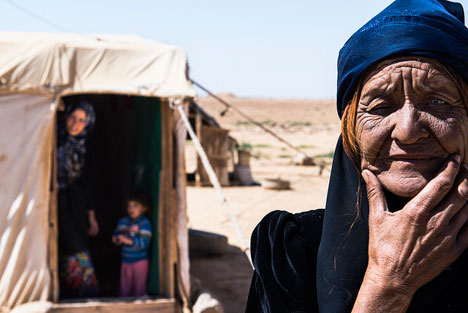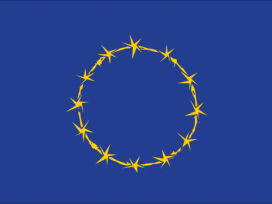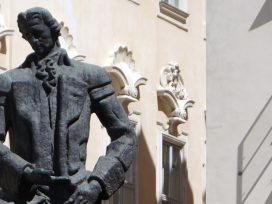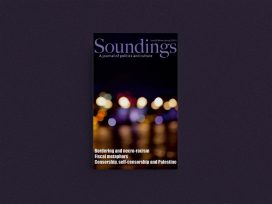Forced exits can be created by traumas of environment, economy or national civil war. They produce refugees who are invariably traumatized. Their claims on the hospitality of the nations in which they land are always in a grey zone between hospitality, sanctuary and incarceration, because they are usually in a categorical grey zone that combines features of the stranger, the victim, the criminal and the undocumented visitor.

Syrian refugee camp, Jordan, 26 September 2015. Photo: Enes Reyhan. Source: Flickr
The trauma of the forced refugee provokes the deepest anxieties of the modern nation-state, which relies on boundaries, censuses, taxes and documentation. The heart of the new traumas that the forced refugee experiences in the new country is that he or she has a plot (a narrative, a story) but no character, identity or name. The challenge of evolving a new form of legal and ethical hospitality is to create a name to fit the plot, an identity to fit the narrative.
The challenge of the modern nation-state is that, whereas its key narratives of identity rely on fixed starting points (blood, language, religion, territory), the forced exit is usually produced precisely by originary traumas of blood, language, religion or location. This raises the question of how to build a new relationship between plot and character in modern nation-states and a world of forced exits, where there is as yet no ethical foundation for seeing traumatic movement as the pivot of a serious identity for some citizens.
Migration and the crisis of the nation-state
After the famous treaty of Westphalia in 1648, the principle of territorial sovereignty becomes the foundational principle of the nation-state, though many other ideas affect its cultural self-imaging and self-narrativizing: these include ideas about language, common origin, blood, soil and various other conceptions of ethnos. Still, the fundamental political and juridical rationale and basis of the system of nation-states is territorial sovereignty, however complexly understood and delicately managed in particular post-imperial settings.
Throughout the world, immigrants, cultural rights and state protection of refugees are growing problems, especially since very few states have careful ways of defining the relationship of citizenship, birth, ethnic affiliation and national identity. The crisis is nowhere clearer than in Europe today, where the struggle to control and manage the intensified wave of migrants from the Middle East and North Africa is threatening to unravel the very foundations of European ideas of full citizenship, asylum and refuge, and expose the exclusionary foundation of European thinking about cultural markers of national belonging.
But in many countries, problems with immigrants, race, birth and residence are becoming problems of one or another kind. Think, for example, of Mexicans in the United States, Rohingya Muslims leaving Bangladesh and Myanmar for other countries in South East Asia, and migrants from the rest of Africa in South Africa. One source of this problem is that modern conceptions of citizenship, tied up with various forms of democratic universalism, tend to demand a homogeneous people with standardized packages of rights. Yet the realities of ethno-territorial thinking in the cultural ideologies of the nation-state demand discrimination between different categories of citizens even when they all occupy the same territory. Resolving these conflicting principles is inevitably a violent and uncivil process.
Territory can thus be seen as the crucial problem in the contemporary crisis of the nation-state or, more precisely, of the crisis of the relationship between nation and state. Insofar as nation-state ideologies rest on some sort of implicit idea of ethnic coherence as the basis of state sovereignty, they are bound to minoritize, degrade, penalize or expel those seen to be ethnically minor. Insofar as these minorities (either as guestworkers, refugees or illegal aliens) enter into new polities, they require reterritorialization within a new civic order, whose ideology of ethnic coherence and citizenship rights they are bound to disturb, since all modern ideologies of rights depend, ultimately, on the closed group of appropriate recipients of state protection and patronage. Thus second-classness and third-classness are conditions of citizenship which are inevitable entailments, however plural the ethnic ideology of the state and however flexible its accommodation of refugees and other weakly documented visitors.
Now none of this would be a problem except that the conditions of global economic, labour and technological organization create both dramatic new pushes and pulls in favour of uprooting individuals and groups and moving them into new national settings. Since these individuals and groups have to be cognized within some sort of vocabulary of rights and entitlements, however limited and harsh, they pose a threat to the ethnic and moral coherence of all host nation-states that is at bottom predicated on both a singular and an immobile ethnos.
In these conditions, the state as a push factor in ethnic diasporas is constantly obliged to push out the sources of ethnic noise which threaten or violate its integrity as an ethnically singular territory. But, in its other guise, virtually every modern nation-state is either forced or persuaded to accept into its territory a whole variety of non-nationals, who demand and create a wide variety of territorially ambiguous claims on civic and national rights and resources.
Here we are at the heart of the crisis of the nation-state. It looks at first glance as if the crisis of the nation-state is the fact of ethnic plurality that is the inevitable result of the flow of populations in the contemporary world. But on closer inspection, the problem is not ethnic or cultural pluralism as such, but the tension between diasporic pluralism and territorial stability in the project of the modern nation-state.
What ethnic plurality does (especially when it is the product of sudden population movements) is to violate the sense of isomorphism between territory and national identity on which the modern nation-state relies. More exactly, what these diasporic pluralisms expose and intensify is the gap between the powers of the state to regulate borders, monitor dissent and distribute entitlements within a finite territory and the fiction of ethnic singularity on which all nations ultimately rely. In other words, it becomes increasingly difficult to view the territorial integrity that justifies states and the ethnic singularity that validates nations as seamless aspects of one another.
Migration, memory and media
In my book, Modernity at Large (1996), I suggested that in the era of globalization, the circulation of media images and the movement of migrants created new disjunctures between location, imagination and identity. More specifically, I suggested that in many social locations throughout the world, especially those characterized by media saturation and migrant populations, “moving images meet mobile audiences”, thus disturbing the stability of many sender-receiver models of mass communication. This has many implications for what I then called “the work of the imagination”, and I particularly stressed the new potentials that this situation created for the proliferation of imagined worlds and imagined selves.
Migrants, especially the poorer migrants of this world, are not thriving in a world of free markets, consumer paradise or social liberation. They are struggling to make the best of the possibilities that are opened to them in the new relationships between migration and mass mediation. There is no doubt that migrants today, as migrants throughout human history, move either to escape horrible lives, to seek better ones, or both. The only new fact in the world of electronic mediation is that the archive of possible lives is now richer and more available to ordinary people than ever before. Thus, there is a greater stock of material from which ordinary people can craft the scripts of possible worlds and imagined selves. This does not mean that the social projects that emerge from these scripts are always liberating or even pleasant. But it is an exercise in what I have called “the capacity to aspire” (Appadurai, 2004).
Muslim migrants from North Africa, Syria, Turkey and Iraq sometimes drown in the Mediterranean as they seek to swim to the shores of Italy, Greece or Spain from illegal boats, as do their Haitian counterparts in the Florida waters; others perish in the containers that cross the English Channel. It is also true that young women from the ex-socialist republics often end up brutalized as sex-workers in the border-zones between the old and the new Europe, as do Philippine domestic workers in Milan and Kuwait, and South Asian labourers (both male and female) in Dubai, Saudi Arabia and Bahrain. Such examples of the brutalizing of migrants can be multiplied: poorer migrants today frequently end up as undocumented citizens, objects of racist laws and sentiments, and sometimes as targets of ethnocidal violence in locations from Rwanda to Indonesia.
But is this suffering the whole story? Does it tell us everything we need to know about how these projects for movement were formed, about what efforts it took to summon the resources to move, of what was made possible by meagre remittances, of how the relationship of men and women is often recalibrated under the conditions of migration, of the doors that are opened for migrant children, and, finally, of the value of negotiating for new opportunities, even in harsh circumstances?
The work of the imagination, especially for poorer migrants, is critical for exercising the capacity to aspire. Without developing this capacity, which may also lead to rape, exploitation and death (for migration is a world of risk), poor migrants will always remain captive to the wishes of the vanguard, to the prison of their own domestic tyrannies and to the self-fulfilling prophecies of those business-class revolutionaries who always know, in advance, how best poor people should exercise their agency and which level of risk is most appropriate to them.
So I insist that the work of the imagination is not a privilege of elites, intellectuals and cosmopolitans but is also being performed by poor people, notably in the worldwide pursuit of their possibilities to migrate, whether to near or far locations. Denuding these proletarian projects of the dimension of fantasy, imagination and aspiration, reducing them to mere reflexes of the labour market or of some other institutional logic, does nothing for the poor other than to deny them the privilege of risk-taking. This is the opposite of what Charles Taylor calls “the politics of recognition”.
The living archive
In this perspective, what can we say about the place of archives, narratives and memory in the building of migrant identity? Here the idea of the living archive becomes especially useful. Migrants have a complex relationship to the practices of memory and, thus, to the making of archives, for several reasons.
First, because memory becomes hyper-valued for many migrants, the practices through which collective memory is constructed are especially subject to cultural contestation and to simplification. Memory, for migrants, is almost always a memory of loss. But since most migrants have been pushed out of the sites of official/national memory in their original homes, there is some anxiety surrounding the status of what is lost, since the memory of the journey to a new place, the memory of one’s own life and family world in the old place, and official memory about the nation one has left have to be recombined in a new location. Migration tends to be accompanied by a confusion about what exactly has been lost, and thus of what needs to be recovered or remembered. This confusion leads to an often deliberate effort to construct a variety of archives, ranging from the most intimate and personal (such as the memory of one’s earlier bodily self) to the most public and collective, which usually take the form of shared narratives and practices.
Media plays a critical role in the construction of the migrant archive since circulation, instability and the disjunctures of movement always cast doubt on the “accidental” trace through which archives are sometimes assumed to emerge. In the effort to seek resources for the building of archives, migrants thus often turn to the media for images, narratives, models and scripts of their own story, partly because the diasporic story is always understood to be one of breaks and gaps. Nor is this only a consumer relationship, for in the age of the Internet, literate migrants have begun to explore social media, chat rooms and other interactive spaces in which to find, debate and consolidate their own memory traces and stories into a more widely plausible narrative. This task, never free of contest and debate, sometimes does take the form of what Benedict Anderson disparagingly called “long-distance nationalism”. But long-distance nationalism is a complex matter, which usually produces many sorts of politics and many sorts of interest. In the age in which electronic mediation has begun to supplement and sometimes even supplant print mediation and older forms of communication, imagined communities are sometimes much more deeply real to migrants than natural ones.
Interactive media thus play a special role in the construction of what we may call the diasporic public sphere (an idea I proposed in Modernity at Large to extend the insights of Habermas, Anderson and others about national public spheres), for they allow new forms of agency in the building of imagined communities. The act of reading together (which Anderson brilliantly identified in regard to newspapers and novels in the new nationalisms of the colonial world) are now enriched by the technologies of the web, Facebook, Twitter and Google, creating a world in which the simultaneity of reading is complemented by the interactivity of messaging, searching and posting. Thus, what we may call the diasporic archive, or the migrant archive, is increasingly characterized by the presence of voice, agency and debate, rather than of mere reading, reception and interpellation.
But the migrant archive operates under another constraint, for it has to relate to the presence of one or more narratives of public memory in the new home of the migrant, where the migrant is frequently seen as a person with only one story to tell – the story of abject loss and need. In his or her new society, the migrant has to contend with the minority of the migrant archive, of the embarrassment of its remote references and of the poverty of its claims on the official “places of memory” in the new site. Thus, the electronic archive becomes a doubly valuable space for migrants, for, in this space, some of the indignity of being minor or contemptible in the new society can be compensated, and the vulnerability of the migrant narrative can be protected in the relative safety of cyberspace.
What is more, both new electronic media as well as traditional print media among migrant communities allow complex new debates to occur between the memory of the old home and the demands of public narrative in the new setting. Migrant newspapers in many communities become explicit sites for debate between micro-communities, between generations and between different forms of nationalism. In this sense, the migrant archive is highly active and interactive, as it is the main site of negotiation between collective memory and desire.
As the principal resource in which migrants can define the terms of their own identities and identity-building, outside the strictures of their new homes, the diasporic archive is an intensified form of what characterizes all popular archives: it is a place to sort out the meaning of memory in relationship to the demands of cultural reproduction. Operating outside the official spheres of both the home society and the new society, the migrant archive cannot afford the illusion that traces are accidents, that documents arrive on their own and that archives are repositories of the luck of material survival. Rather, the migrant archive is a continuous and conscious work of the imagination, seeking in collective memory an ethical basis for the sustainable reproduction of cultural identities in the new society. For migrants, more than for others, the archive is a map. It is a guide to the uncertainties of identity-building under adverse conditions. The archive is a search for the memories that count and not a home for memories with a pre-ordained significance. This living, aspirational archive could become a vital source for the challenge of narratability and identity in contemporary times.
Narratives without identities
Citizenship in modern nation-states, such as Germany, is built on a tight fit between plot and character (or story and actor, or narrative and identity). The legal and bureaucratic origins of the modern nation-state seek to provide a territorial ground for stabilizing and connecting plot and character in verifying legitimate citizens. The story of birth to parents who are citizens is the strongest example of this convergence, for it implies territorial, personal and sanguinary stability.
Legal naturalization procedures, on the basis of marriage, work or investment, produce this stability and convergence between plot and character. These procedures allow changes in the status of an immigrant from refugee or illegal to full citizenship or quasi-citizenship, by “naturalizing” their ties to the national territory. For refugees, asylum-seekers and almost all other undocumented migrants, the problem is that their stories (however painful and dramatic) come with names (personal names) but no characters, that is, no identities which fit the legal narrative requirements of legitimate migration. This is not simply because they arrive suddenly, traumatically and violently within the new national space, or to a transitional national space on their way to their preferred final destination. It is because, in the eyes of their new hosts, they are truly “nobodies” that is they have no identities that fit their new circumstances.
Here the main problem is that the modern nation-state has no room for narratives based not in the past (blood, birth, parenthood, language, etc.) or in the present (work, marriage, student status, etc.) but primarily on the future: on the aspiration for a better home, a safer life, a more secure horizon. There are no aspirational narratives for refugees, in the way that there are aspirational narratives for work or skill-based applicants for immigration. The fact is that refugees are today supplicants who wish to become applicants for citizenship in countries like Germany. Their stories of suffering, oppression and violence in their home countries or in the camps which they have elected to leave on their tortuous journeys to their aspirational destinations, are stories of abjection and supplication and these stories are not easy to convert into the narratives of application and aspiration.
Here then is the narrative challenge that goes beyond the policing, administrative and legal challenges that face migrants in today’s Europe as well as their hosts. How do we create stories based on imagined future citizenship in a context where the past (birth, parenthood and blood) is still the currency of most citizenship laws? How can longing be turned into belonging? How can hospitality to the stranger be made a legitimate basis for the narrative of citizenship?
To provide deep and sustainable answers to these questions we can consider two approaches. The first is to help the strengthening and deepening of migrant archives, seeing them not only as storehouses of memory but also as aspirational maps. This might allow us to see the common ground between their aspirations and our own and thus to find a richer cultural road to the legal and bureaucratic solutions currently being debated. The other approach is to find ways to make migrant narratives and identities a basis for secure citizenship, which will require re-thinking the very architecture of sovereignty in the contemporary world. That daunting task cannot be addressed here today but I hope I have described the conditions that make it an unavoidable challenge.








